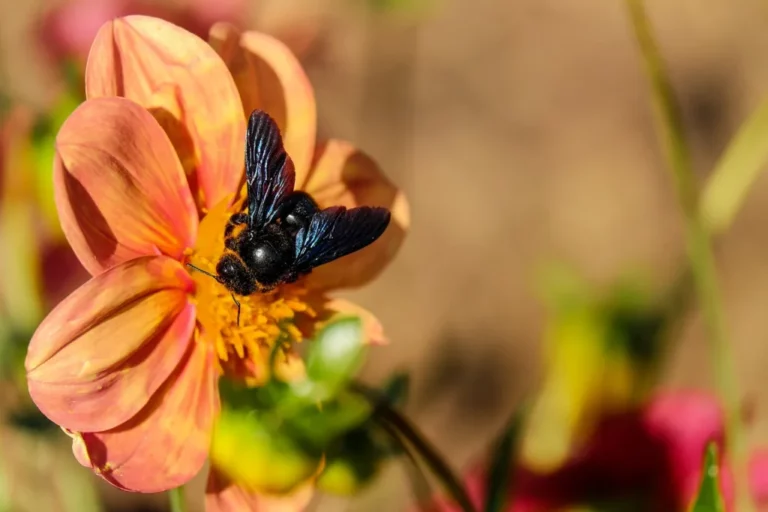The Meaning of Carpenter Bees in the Natural Ecosystem
Carpenter bees (Xylocopa species) play a crucial role in the natural ecosystem as pollinators. They are important contributors to the reproduction and survival of many plant species. These bees are known for their ability to efficiently transfer pollen from one flower to another, aiding in fertilization and seed production.
Pollination Efficiency
Carpenter bees have unique characteristics that make them efficient pollinators. Their large size allows them to carry relatively more pollen compared to smaller bee species. Additionally, they exhibit a behavior called “buzz pollination,” where they vibrate their flight muscles at a specific frequency while collecting nectar, causing the release of pollen from flowers that require this type of stimulation for effective pollination.
What do dead elephants symbolize in dreams?
Plant Diversity
Carpenter bees contribute to the diversity of plant species by visiting a wide range of flowering plants for nectar and pollen. They are generalist feeders and can be found in various habitats, including forests, meadows, gardens, and urban areas. By visiting different plants, carpenter bees facilitate cross-pollination between plant species, promoting genetic diversity and enhancing the overall health of ecosystems.
How Carpenter Bees Contribute to Pollination and Plant Reproduction
Carpenter bees play a vital role in the process of pollination and plant reproduction through their foraging behavior and body structure. They visit flowers in search of nectar as a source of energy but unintentionally transfer pollen grains from male reproductive organs (anthers) to female reproductive organs (stigma), enabling fertilization.
Foraging Behavior
When carpenter bees land on flowers, they use their long tongues or proboscis to extract nectar hidden deep within floral structures. As they probe for nectar, their bodies become coated with pollen. When they move on to the next flower, some of the pollen rubs off onto the stigma, facilitating pollination.
Body Structure
Carpenter bees have specialized body structures that aid in effective pollination. Their hairy bodies provide ample surface area for pollen attachment and transport. Additionally, their large size allows them to access nectar from flowers with deep corollas or long tubular structures that may not be accessible to smaller pollinators. These adaptations make carpenter bees efficient pollinators for a wide range of flowering plants.
The Significance of Carpenter Bees’ Behavior of Boring into Wood
One unique behavior of carpenter bees is their ability to bore into wood to create nesting sites. While this behavior may seem destructive, it has ecological significance and benefits both the bees and other organisms in the ecosystem.
Unveiling the Spiritual Symbolism of Black Wolves
Nesting Sites
Female carpenter bees excavate tunnels in dead or decaying wood, such as tree trunks, logs, or wooden structures like fences or buildings. These tunnels serve as nesting sites where they lay their eggs and rear their offspring. By creating these cavities, carpenter bees contribute to the availability of suitable habitats for themselves and other cavity-nesting species such as certain birds and insects.
Wood Decomposition
The process of boring into wood by carpenter bees also aids in wood decomposition. As they tunnel through wood, they break it down into smaller particles, facilitating decomposition by microorganisms like fungi and bacteria. This decomposition process releases nutrients back into the ecosystem, contributing to soil fertility and supporting plant growth.
How Carpenter Bees Differ from Other Bee Species in Their Ecological Role
While all bee species play important roles as pollinators, carpenter bees differ from other bee species in their ecological role due to their nesting behavior and foraging preferences.
Nesting Behavior
Unlike many other bee species that create nests in the ground or use pre-existing cavities, carpenter bees have adapted to bore into wood to create their nests. This behavior allows them to utilize a unique nesting resource, contributing to the availability of cavity habitats in ecosystems.
Foraging Preferences
Carpenter bees are known for their preference for certain types of flowers. They are often attracted to tubular-shaped flowers, such as those found on trumpet vines or salvias, which may not be visited by other bee species. This specialization in flower preference allows carpenter bees to access nectar sources that may be overlooked by other pollinators, thereby increasing the chances of pollination for these specific plant species.
The Spiritual Meanings and Symbolism of Dog Urine
Cultural and Symbolic Meanings Associated with Carpenter Bees in Different Societies or Folklore
Carpenter bees have cultural and symbolic meanings in various societies and folklore around the world. These interpretations often vary depending on cultural beliefs, traditions, and local contexts.
Symbol of Hard Work
In some cultures, carpenter bees symbolize hard work and perseverance due to their industrious nature. The act of boring into wood is seen as a representation of determination and dedication to creating a secure home or nest. These qualities associated with carpenter bees are often admired and used as metaphors for human virtues.
Fertility and Abundance
In certain folklore traditions, carpenter bees are associated with fertility and abundance. Their role as pollinators, facilitating the reproduction of plants and the production of fruits and seeds, is seen as a metaphorical parallel to human fertility and bountiful harvests. In some societies, images or representations of carpenter bees may be incorporated into rituals or ceremonies related to fertility and agricultural abundance.
Protection and Defense
In some cultures, carpenter bees are considered protectors or defenders. Their ability to bore into wood and create nests is seen as a way of safeguarding the natural environment or certain structures. In these interpretations, carpenter bees are revered for their role in maintaining balance and harmony within ecosystems or providing protection against potential threats.
In conclusion, the meaning of carpenter bees lies in their role as important pollinators and builders within ecosystems, showcasing their vital contribution to the natural world.
